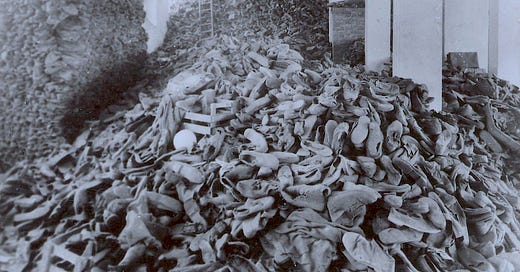I recently attended a community event for young professionals at a local university. To open the program, one of the faculty organizers stood at the front of the room to read what’s known as a “land acknowledgement.” Here is the content of that spiel:
We acknowledge that our institution currently occupies land within the geographic sphere of influence of [Native American tribe]. They maintained a kinship with the land and believed that the land held no boundaries or ownership by Indigenous peoples. Together, we acknowledge the history of genocide and ongoing systemic inequities that have impacted indigenous intergenerational traumas.
We acknowledge that settler colonists and colonial structures are responsible for the displacement and genocide of Indigenous peoples through physical violence, forced removals, and Indigenous erasure. Refugees from genocided tribes formed new kinship relationships within neighboring tribes as a method of survival. We acknowledge that we are uninvited guests currently occupying their ancestral homelands.
At what was supposed to be a joyous gathering of great minds to discuss professional development, we were treated to the term “genocide” repeated three times in the first 5 minutes. While the audience was certainly diverse, I am fairly certain that no actual Native Americans were present. No funds raised from this event were going to support the well-being of the Native Americans. The content of this event had nothing whatsoever to do with indigenous peoples.
In the words of Bill Maher, “either give the land back, or shut the fuck up.” Yes, the display of faux concern for indigenous peoples through “land acknowledgements” is shallow and stupid. We know. But there’s something else about this performative nonsense that irks me, something that must be acknowledged given the moment in which we find ourselves: the casual use of the term “genocide” that appears to have become completely normalized. It is not a phenomenon that should be taken lightly.
The following admission may make me sound like a snowflake, but I’ll come clean: I find the term “genocide” extremely triggering. Each repeat of the term “genocide” at this event felt like a twist of a knife into my chest. I didn’t come there to hear that. I so wanted to tell the speaker that this language was inappropriate given the context of what we were there to discuss, but ultimately decided that doing so wouldn’t be worth my time or energy (hence this article to vent my frustrations).
Genocide is one of the worst sins known to humanity. Only humans are capable of committing it, because it requires a very clear intent: the deliberate mass murder of a specific nation or ethnic group viewed as inferior, with the intent of wiping out that targeted group. It also requires a certain amount of power to be bestowed upon those charged with carrying it out. In essence, the group with the power exterminates (or attempts to) those deemed “the other” because they can.
The most documented genocide in modern history is the Holocaust during World War II, during which the Nazis murdered 11 million—mostly Jews, but also gays, gypsies, and other minorities. But there were several others that occurred during that same century, which include the Armenians of the Ottoman Empire, the Kurds of Iraq/Iran, and the indigenous Maya of Guatemala. It’s a horrendous global phenomenon that shows no signs of extinction, with both the perpetrators and the victims being of all colors and religions. The sad fact is, there are actual genocides occurring as I type these words that get little to no media attention. Can you name one?
None of what I express here is to detract from the real horrors that actual genocide victims have experienced throughout history. Their pain must be acknowledged in the proper space and context. I regard this issue in the same way I wish outsiders would react to my own people’s history: by not rolling your eyes when I say that the casual use of the term “genocide” bothers me because, yes, my own people experienced a heavily documented one; and by not throwing around the term “genocide” like it’s just an item to check off of a list on the agenda.
If anyone can be the victim of genocide, then no one actually is. If “genocide” is just a word we can throw around like a verbal party game to make ourselves feel morally superior, then the term becomes meaningless. This behavior has the effect of minimizing the real trauma shared by those who actually experienced it.
If you feel the need to throw around the term “genocide" as a way to make yourself appear like you give a flying fuck about the minority group that such virtue signaling performances claim to acknowledge, you are not being sensitive to the marginalized. You are just being an asshole. Was that triggering for you? Good—you triggered me first.
Thanks for reading! I keep most of my content free to make it as accessible as possible during our war against lies and misinformation. If you liked what you read and wish to support my work, please consider becoming a paid subscriber or making a one-time donation.




![One the warehouses filled with victims' shoes up to the ceiling. Auschwitz, Occupied Poland 1944. [2928 × 2076] : r/HistoryPorn One the warehouses filled with victims' shoes up to the ceiling. Auschwitz, Occupied Poland 1944. [2928 × 2076] : r/HistoryPorn](https://substackcdn.com/image/fetch/$s_!YCh3!,w_1456,c_limit,f_auto,q_auto:good,fl_progressive:steep/https%3A%2F%2Fsubstack-post-media.s3.amazonaws.com%2Fpublic%2Fimages%2Fd3f4568d-f5f9-47fe-9a69-b94f1a4a826f_2027x1414.jpeg)
I feel the same way. Hearing the word used on a daily basis about Gaza when their birth rate is higher than their death rate is infuriating.
Someone actually said to me recently, “I don’t know why the Jews get to claim the word ‘genocide’.” Umm duh… because a Jew coined it in the aftermath of the holocaust? Clearly it was a problem that we are controlling how the word is used so that it can’t legitimately be used in any way anyone wants. We’re so greedy! As if controlling the banks and the weather wasn’t enough!